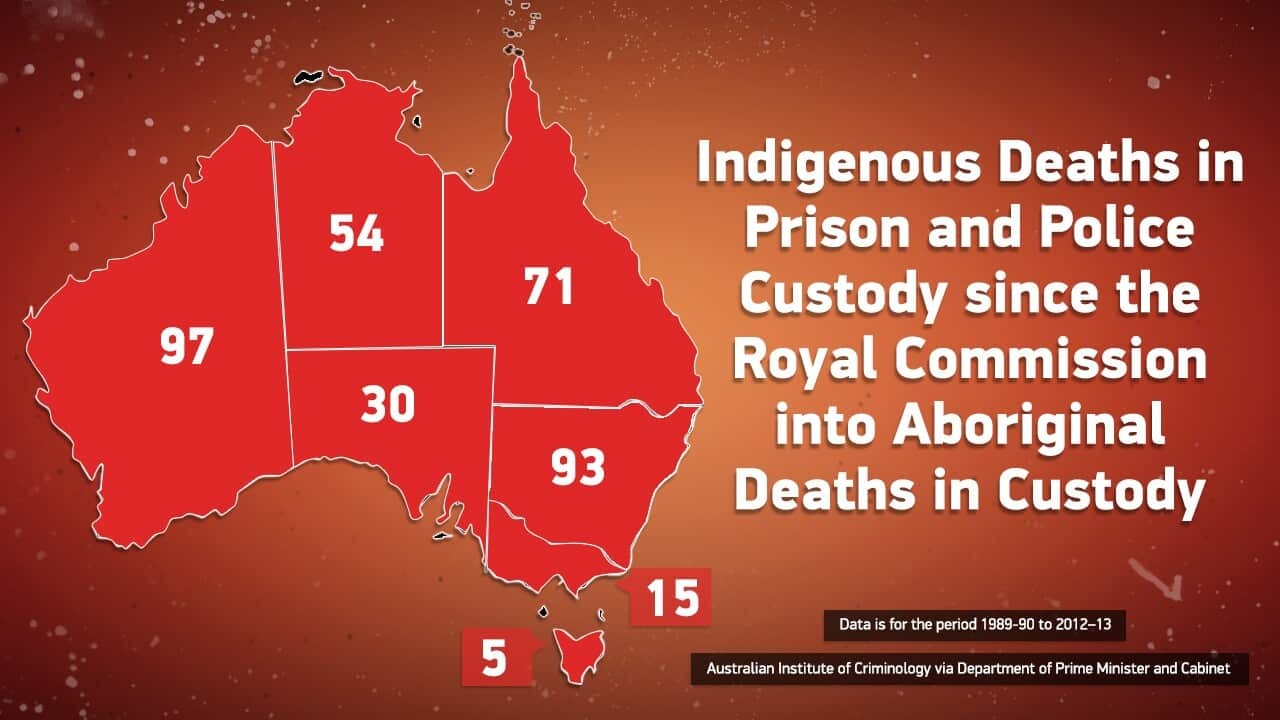"In Western Australia, a kid [was caught] stealing a packet of biscuits. Now in anyone's world a packet of biscuits for someone who's hungry being stolen isn't a cause to send people to jail, but it certainly is in places like WA," Aboriginal and Torres Strait Islander Justice Commissioner Mick Gooda told 'The Point'.
Mr Gooda was speaking ahead of Friday which marks the 25th anniversary of the findings handed down by the Royal Commission into Aboriginal Deaths in Custody.
25TH ANNIVERSARY OF ROYAL COMMISSION INTO ABORIGINAL DEATHS IN CUSTODY

'My father's work is far from done', says daughter of Aboriginal deaths in custody advocate
The royal commission, which commenced in 1987, was tasked to investigate the circumstances behind 99 Aboriginal deaths in custody that occurred across Australia between the period of 1980-1989, a period where Indigenous people were 17.3 per cent more likely to be incarcerated than non-Indigenous Australians.
It handed down 339 recommendations including that custodial authorities be required by law to immediately notify the Coroner’s Office of all deaths in custody, and that funding be directed to organisations that provide Indigenous people with links to their culture to nurture well being.
Since the royal commission began, Indigenous deaths in custody continue, comprising 18.7 per cent of all deaths in custody in Australia through the period 1989 to 2013.
Of the 1,195 Australians who died in prison custody, 218 were Indigenous. Of the 750 who died in police custody, 147 were Indigenous.
Yet Indigenous Australians make up about 2 per cent of the country’s population.
Jackie Huggins, co-chair of the National Congress of Australia's First Peoples, says Indigenous people know how to lower the over-representation.
We need "to encourage our community-controlled organisations, who know the answers, who have the solutions for government to work with them to adequately fund and resource them to their ability to really have absolute in roads into this very disproportionate incarceration rate that we see," Ms Huggins told 'The Point'.
She mentions justice reinvestment, which redirects funds from prison costs to preventative community initiatives, such as skill building, as one such answer.
JUSTICE REINVESTMENT

From prison cells to navigating the seas

Source: NITV
Deaths in custody since the royal commission
Eighteen Indigenous deaths in custody occurred in the period 1989-1990, when the Royal Commission into Aboriginal Deaths in Custody commenced.
The amount stayed around that mark during the 1998-1999 period at 17.
The number lowered to nine between 1991-1992 but rose to 15 during the period 1993-1994 and jumped again to 18 between 1999-2000.
The amount of Indigenous deaths in custody peaked between 2009 and 2010, a period that saw 20 deaths in custody.
It lowered the years after with the latest data (2012-2013) showing 13 deaths in custody.
Australian and Torres Strait Islander people are jailed at 13 times the rate than their non-Indigenous counterparts, according to 2014 Australian Bureau of Statistics data.
Total figures may be lower because of missing information on Indigenous status.











